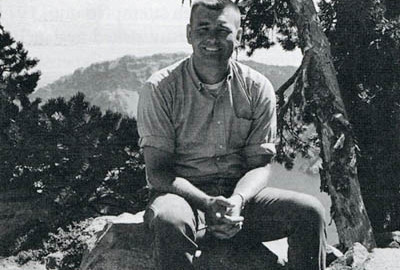These were considerations and so during my last field trip to Crater Lake in September, 1978, Mark Forbes and I had lunch. I was going to be there another day and Mark recommended that before I left I should talk to Jim Rouse [the superintendent] and discuss my research. Forbes asked me if I was interested in coming back. I said I was coming back as long as you guys are willing to allow me to use a boat and I can be a VIP. I wanted to continue this work. He said I should visit with Rouse, tell him what you’d like to do, and give him a summary of your research findings. He arranged for me to meet with Rouse, so I met with Rouse in his office shortly before I was gonna leave for Portland the next day. I’ll be frank about this. Jim Rouse was really not interested in what I had to say. He used to refer to me as the man with the disk. I didn’t appreciate this. But in order to work there, I couldn’t raise my objections. I had to swallow it and continue with my work, but I viewed it as an insult. That’s the first thing he said when I walked into his office. Throughout our conversation he seemed more interested with something on his desk and never really paid much attention to what I was saying. That was until I got to the word sewage, then he suddenly looked up and became quite interested in what I had to say. What about the sewage? I said, “Well, Jim, I think based on my findings it is possible, but it’s not certain at all. What we might be seeing here is that the lake is changing and somehow algae are becoming more abundant. The reason they are becoming more abundant is they are getting more nutrients from somewhere. Maybe there’s a natural increase in nutrient availability in the lake, I don’t know. On the other hand, it may be that the lake is receiving septic wastes or something. Is it possible that sewage could get in the lake?” He said, “There’s no sewage going into the lake. We have a couple of pit toilets on Wizard Island but we’ve taken care of those.” I asked about the sewage that comes from the lodge, cafeteria, and the campgrounds. Where does it all go? He said that it goes to the lagoons by headquarters. I replied, “Are you sure that none of that sewage is getting into the lake?” He said yes. I then asked, “How do you know?” He said that our [NPS] hydrologist in San Francisco told me that it’s not going in the lake. I asked if he did a study. Where is the information so we can verify it? Rouse said there isn’t a study, he [the hydrologist] just told me there isn’t any sewage going into the lake. I then said, “How about the lagoons down there?” He replied that sewage can’t get into the lake because the lagoons are located at an elevation that’s below the surface of the lake.
They are supposedly lined, but they are still at 6300 feet (23).
I then asked him if I could come back next year. He said, “Write us another letter like you did this year and we’ll see.” Rouse asked me if Mark gave me an investigator’s report to fill out.” I said, I’ll send it in right away. I still have a copy. I submitted it to Seattle, to the regional office. I summarized my progress that particular summer and discussed this business about possible sewage and eutrophication, then signed it. I sent it up there and never heard another word about it.


